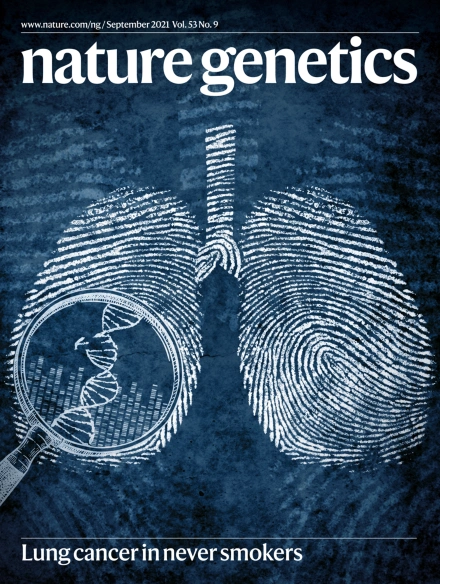Friday, 1 October 2021. News briefs from the Nordic Society of Human Genetics and Precision Medicine.
In the September NSHG-PM webinar, we heard about Norway’s famed Norwegian Mother, Father and Child Cohort Study (MoBa). “The most important discoveries lie ahead of us,” Camilla Stoltenberg of the Norwegian Institute of Public Health told us. Her colleague Alexandra Havdahl followed up with a deep dive on using MoBa genetic data to understand influences on children's neurological development. Watch the archived webinar here.
Great presentations by Camilla Stoltenberg & Alexandra Havdahl @folkehelseinst @alexhavdahl
Birth Cohorts as the Hadron Colliders of Research in the Nordic Countries - Norwegian Mother, Father and Child Cohort Study (MoBa) @NordicPrecMed @HakonHeimer https://t.co/ax8tyd0uax
— John McGrath (@John_J_McGrath) September 29, 2021
__________________________________________________________________________________________________
NORDIC FINDINGS
Nature Genetics: Bigger Sample Size Yields More Risk Genes
 In more than 90,000 cases and one million controls, an international team with a strong Nordic component found 38 risk loci for late-onset Alzheimer’s disease (AD), including seven new ones. The variants implicate microglia, immune cells, and protein breakdown.
In more than 90,000 cases and one million controls, an international team with a strong Nordic component found 38 risk loci for late-onset Alzheimer’s disease (AD), including seven new ones. The variants implicate microglia, immune cells, and protein breakdown.
The study analyzed samples of people of European ancestry diagnosed with AD or with a family history of the disease from 13 cohorts, including Finland, Iceland, Norway, and Sweden. This study is part of the international Psychiatric Genomics Consortium-Alzheimer’s Workgroup, and was led by Danielle Posthuma from Vrije Universiteit Amsterdam and Ole Andreassen from University of Oslo.
The findings are summarized here and discussed in more detail in an AlzForum story.
Nature Genetics: Two Independent Fine-Mapping Analyses
After genome-wide association studies (GWAS) find variations linked to traits and disease, it takes other statistical tools, such as gene expression and splicing quantitative trait loci (eQTLs), to fine-map those variations to specific changes in the biology and identify potential target genes for therapy. Two independent international teams led by Estonia researchers have a pair of new fine-mapping analyses.
In one paper, researchers report the methods they used to create the eQTL Catalogue, the largest compendium of uniformly processed eQTL summary statistics and fine-mapping results. The database has a search engine for entering the coordinates of a genetic variant and finding a list of genes regulated by that variant. The collaboration with UK researchers started as a way to work around data-sharing restrictions, according to blog posts with co-first author Nurlan Kerimov and co-senior author Kaur Alasoo at University of Tartu. Now, the team is looking for collaborators who would like to contribute their datasets in a federated manner. Kerimov offers a tweetorial.
Most genetic variants associated with traits and diseases work through regulatory mechanisms. The other study analyzes genomic data from the blood samples of more than 30,000 people to identify thousands of new regulatory regions that seem to influence a smaller core group of disease-linked genes. The findings are a step toward precision medicine, reads a news release from Australian collaborators. The resource is now available to researchers worldwide.
Stay up-to-date on all Nordic Research
The NSHG-PM generates and curates a biweekly list of papers from members of the community and other Nordic researchers in human genetics and precision medicine.
__________________________________________________________________________________________________
DEADLINES, DEADLINES
Join the who’s who of Nordic human genetics and precision medicine at the upcoming meeting and workshop.
Monday, 8 October 2021: Abstract deadline for 2021 NSHG-PM General Conference (8-9 November 2021).
Friday, 8 October 2021: Abstract deadline for 2021 Workshop on Research Response to COVID-19 in Nordic Countries (4 November 2021).
__________________________________________________________________________________________________
FEATURED JOBS AND TRAINING OPPORTUNITIES
Interested in finding out how mental health is affected by Covid-19 using data (incl PRS and medical records) from the internationally renowned #MoBa study? Come do a PhD with our friendly team at the Norwegian
— Helga Ask (@helga_ask) September 13, 2021
Institute of Public Health. Please retweet! https://t.co/yMf2T7Pmxs pic.twitter.com/26Qaw1p3An
We are hiring! PhD position in psychiatric and social epidemiology in beautiful Aarhus (??) joining our team @dceaarhus and colleagues @John_J_McGrath @julie_dreier @ToftSorensen. Grateful to @DFF_raad for financial support! #epitwitter Please RT ?https://t.co/eFUP4FnyKK pic.twitter.com/VMjexVKBwL
— Oleguer Plana-Ripoll (@oleguerplana) September 16, 2021__________________________________________________________________________________________________
WHAT WE’RE READING
1. Special section on the human genome (Science magazine)
2. The intersection of genomics and big data with public health: Opportunities for precision public health (PLOS Medicine)
3. Science not silence – a positive spin on negative results (Curie, a magazine from the Swedish Research Council)
4. EuroGems: Online resources for genetic and genomic education (European Society of Human Genetics)
5. Large-Scale Population Studies as a Path to Personalized Medicine: Easier Said than Done! (US Centers for Disease Control and Prevention)
__________________________________________________________________________________________________
ABOUT US
Thanks for reading. This news and events roundup was written by Carol Cruzan Morton.
The Nordic Society of Human Genetics and Precision Medicine brings together scientists with stakeholders in the Nordic region to accelerate large-scale research combining molecular, registry, and other data to understand, prevent, and treat common complex diseases.

